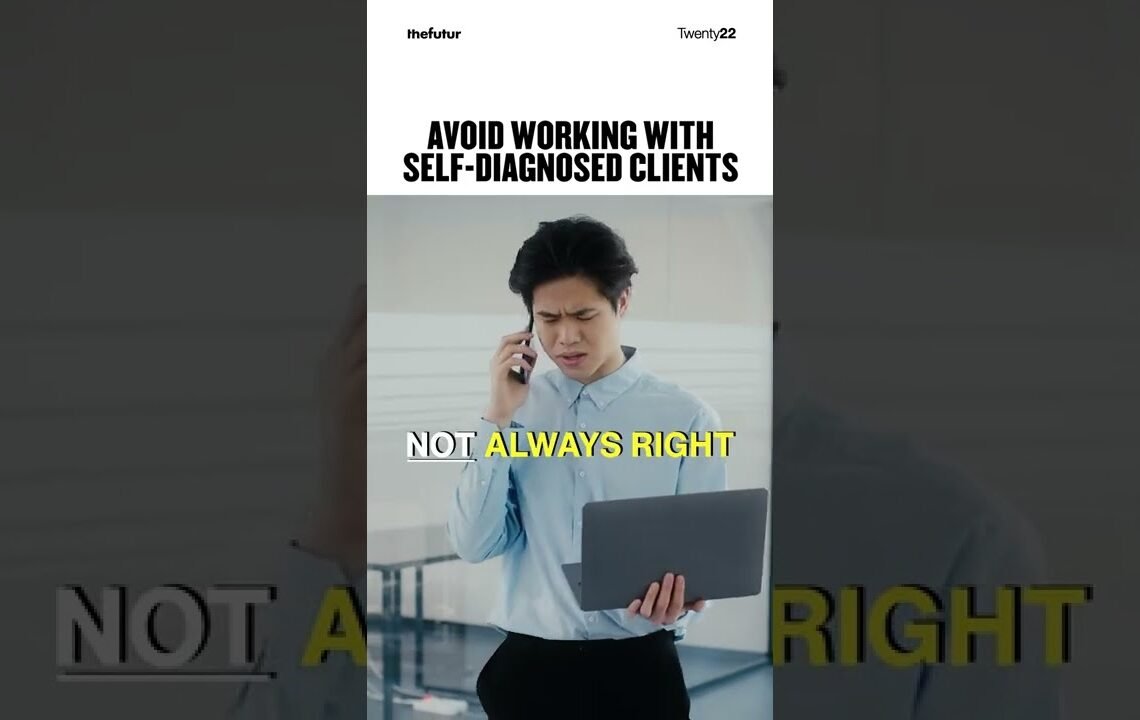Avoid Working With Self Diagnosed Clients

Have you ever wondered how to handle clients who come to you with a self-diagnosed condition? It’s a common issue in the healthcare and wellness industry, as more people turn to the internet for medical information. While it’s great that clients are taking an interest in their own health, working with self-diagnosed clients can be challenging and even harmful. In this blog, we will discuss the importance of avoiding working with self-diagnosed clients and provide tips on how to handle these situations professionally and ethically. Take the necessary steps to protect yourself and your clients by being mindful of the risks involved in working with self-diagnosed individuals.
Avoid Working With Self Diagnosed Clients
When it comes to working with clients, it’s important to maintain a professional approach and avoid letting clients self-diagnose their problems. This can undermine your expertise and lead to miscommunication. Let’s delve deeper into why it’s crucial to steer clear of self-diagnosed clients.
Diagnosed Before Prescribed
One of the key reasons to avoid working with self-diagnosed clients is that diagnosing the problem prematurely can undermine your expertise. Walking in with a preconceived answer before fully understanding the issue can hinder your ability to provide accurate solutions. It’s essential to spend time asking the right questions and uncovering the root cause of the problem before jumping to conclusions.
Importance of Not Letting Clients Self-Diagnose
When clients self-diagnose, they may believe they have identified the problem accurately. However, this may not always be the case. As a professional, it’s crucial to guide clients through a structured diagnosis process to ensure all aspects are thoroughly evaluated. This approach helps in providing tailored solutions that address the actual issue at hand.
Having Your Own Process
Each professional has their own unique process when it comes to diagnosing and solving problems. It’s important to stick to your methodology and not let clients dictate the diagnosis. While clients may have some insights, it’s essential to approach the situation with a fresh perspective and conduct a thorough analysis based on your expertise and experience.
Your Expertise Matters
It’s essential to remember that the customer isn’t always right, especially when it comes to self-diagnosing. Your expertise and knowledge play a crucial role in accurately identifying and addressing the client’s issues. By staying true to your methods and not letting clients self-diagnose, you uphold your professional integrity and ensure a more effective outcome.
Spending Time with Clients
Diagnosing a problem requires time and effort. It’s important to invest the necessary time with clients to understand their requirements, challenges, and goals. By engaging in meaningful discussions and conducting a thorough analysis, you can uncover insights that may have been overlooked by a self-diagnosed approach.
Setting Expectations
When working with clients, it’s crucial to set clear expectations from the beginning. Communicate the importance of a structured diagnosis process and explain the value it brings in delivering effective solutions. By being transparent about your approach, you can establish a collaborative relationship built on trust and mutual understanding.
Conclusion
Avoiding working with self-diagnosed clients is vital for maintaining your expertise and ensuring accurate problem-solving. By sticking to your processes, investing time with clients, and setting clear expectations, you can navigate client interactions more effectively and deliver superior outcomes.
FAQ: Avoid Working With Self Diagnosed Clients
Q: Why should I avoid working with self diagnosed clients?
A: Self-diagnosed clients may not have accurate information about their condition, which can lead to incorrect treatment and negative outcomes.
Q: How can I determine if a client is self-diagnosed?
A: Look for signs such as seeking out specific treatments without consulting a healthcare professional, self-diagnosing based on internet research, or refusing to follow recommended diagnostic procedures.
Q: What can I do if a client insists on self diagnosing?
A: It is important to educate the client about the risks of self-diagnosis and encourage them to seek a proper assessment from a qualified professional for accurate diagnosis and treatment.
I hope you find useful my article Avoid Working With Self Diagnosed Clients, I also recommend you to read my other posts in my blog.
If you need help with anything join the community or do not hesitate to contact me.
Please consider joining my newsletter or following me on social media if you like my content.


Leave a Reply